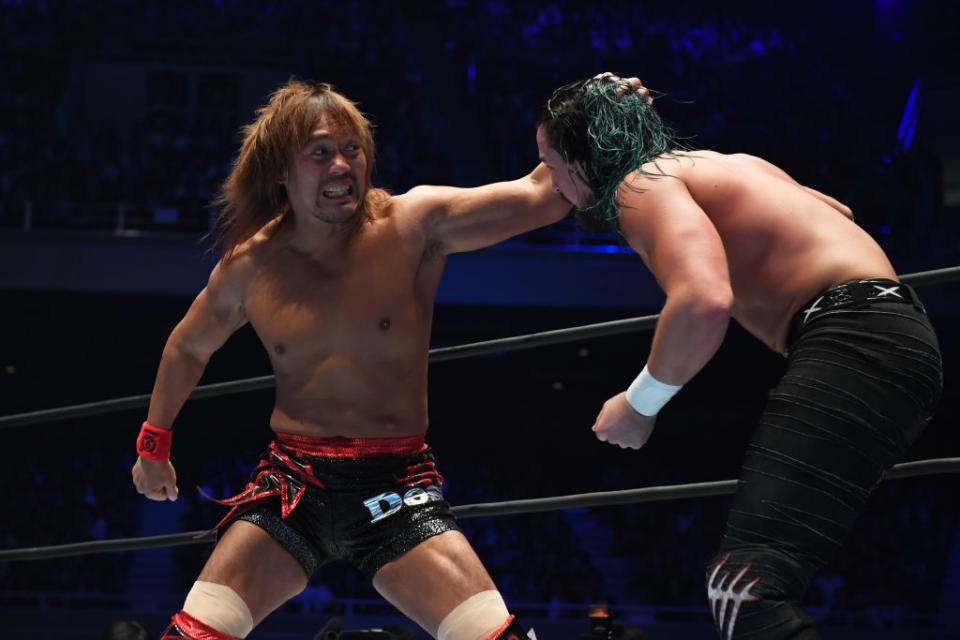Japan’s Next Post-Anime Cultural Export May Be Pro-Wrestling
(Bloomberg) -- If one Japanese business has its way, professional wrestlers will be the next hit entertainment export from the country that introduced the world to Hello Kitty and animation sci-fi films such as “Akira.”
No, they’re not wrestlers from the country’s traditional sport of sumo. Instead, think of theatrical choke holds and acrobatic throws in a ring. Entertainment company Bushiroad Inc. is betting that Tetsuya Naito, Tama Tonga and other Japanese wrestlers can become just as famous as Hulk Hogan or Stone Cold Steve Austin.
Better known for its trading cards and anime characters, Bushiroad has been preparing for this moment for a long time, after buying New Japan Pro-Wrestling seven years ago. Once a popular form of entertainment, pro-wrestling was eclipsed for years by the rise of manga and animation. Only recently has it made a cult-like comeback, with revenue climbing fivefold under the Tokyo-based company’s ownership.
“What’s important is what we do outside the mat,” said Bushiroad’s Chief Executive Officer Yoshitaka Hashimoto, a former IBM marketing employee who took the company public last month. “We do great in the ring, but how can we present it to the rest of the world? One option is video-streaming.”
Bushiroad’s shares rose 11% on Monday, the highest since the IPO. The stock is up 32% since trading began, giving the company a market value of about $369 million.
Hashimoto is seeking to tap into global demand for Japanese media, from the Dragon Ball manga and anime franchise to award-winning movies such as Studio Ghibli’s “Spirited Away.” The archipelago’s animation industry pulled in 2.16 trillion yen ($20.5 billion) in 2017, while the market for trading and gaming cards climbed 24% to 109 billion yen in the year to March. By comparison, New Japan Pro-Wrestling only has sales of about 5 billion yen each year.
Bushiroad, which already streams matches in the U.S., France and other places, is looking to expand the service to English-speaking countries. That could put it in the in the same ring as World Wrestling Entertainment, which has been making its own effort to expand online distribution. The U.S. franchise is reported to be in talks to buy Fite TV, a popular boxing and mixed-martial arts streaming platform.
Founded in 2007, Bushiroad considers itself a promoter and developer of intellectual property. In addition to designing and selling cards and mobile games, the company operates an internet radio station featuring anime voice actors, promotes a girls band called BanG Dream!, and puts on musical shows by anime actresses. Bushiroad also publishes comics and sells anime figurines.
Bushiroad’s sales climbed 27% to 28.9 billion yen for the year that ended in July 2018, although growth is seen slowing to 8.5% for the latest fiscal period to July. Trading-card and mobile games generated more than half of revenue; a fifth came from pro-wrestling.
The company plans to use some of the proceeds from last month’s public offering for games and animation production, advertisements and human-resource development, Hashimoto said. About 4 billion yen of the 7.2 billion yen IPO was newly issued shares, while the rest were sold by existing shareholders.
“Pro-wrestling, card games and animation — they were all seen as subculture 20 years ago, but they’ve since grown into a mainstream culture,” Hashimoto said. For example, 4 in 10 New Japan Pro-Wrestling fans are now women, versus mostly men a generation ago.
To run New Japan Pro-Wrestling, Bushiroad hired Harold George Meij, a Dutch executive who was formerly CEO of toy company Tomy Co. and worked at several multinational companies in Japan. Meij, who said he grew up watching Japanese pro-wrestling as a child when his father worked in in the country, said he doesn’t think Japanese pro-wrestling is inferior in any way to WWE, which had $930 million in revenue last year.
“We hardly perform with the microphone,” Meij said. “We do it from beginning to end, with power fighters, technical fighters, or people who can do acrobatic stunts.”
Pro-wrestling has been popular for decades in Japan. Rikidozan, a former sumo wrestler who switched to pro-wrestling in 1951, is considered the father of Japanese professional wrestling. Others past stars include Giant Baba and Antonio Inoki, who in the 1970s popularized martial-arts attacks and submission holds. Inoki, who once fought Hulk Hogan, later became a politician.
When Bushiroad bought New Japan Pro-Wrestling in 2012, the franchise was struggling amid weak economic growth and tough competition from mixed-martial arts. Under new management, each wrestler was told to set up a Twitter account and start tweeting to fans. The wrestlers were farmed out to quiz shows and other TV programs to attract viewers. There are about 70 wrestlers on its roster, and about 20 are foreigners.
“New Japan Pro-Wrestling used to see themselves as just a sports organization,” Meij said. “Now we consider every wrestler to be a piece of intellectual property, a kind of anime character.”
(Updates with shares in fifth paragraph.)
To contact the reporters on this story: Takashi Nakamichi in Tokyo at tnakamichi1@bloomberg.net;Masatsugu Horie in Tokyo at mhorie3@bloomberg.net;Mei Futonaka in Tokyo at mfutonaka@bloomberg.net
To contact the editors responsible for this story: Marcus Wright at mwright115@bloomberg.net, ;Yuji Okada at yokada6@bloomberg.net, Reed Stevenson, Russell Ward
For more articles like this, please visit us at bloomberg.com
©2019 Bloomberg L.P.


